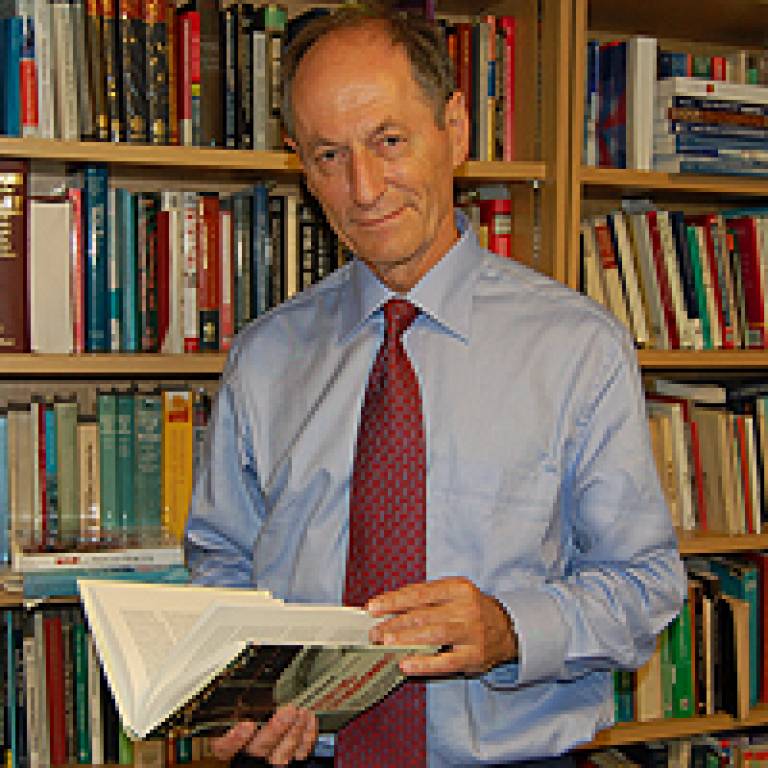Social inequalities are 'killing on a grand scale' says WHO report
28 August 2008
Links:
 ucl.ac.uk/epidemiology/" target="_self">UCL Epidemiology & Public Health
ucl.ac.uk/epidemiology/" target="_self">UCL Epidemiology & Public Health
We can significantly improve global health within a generation, but we must radically re-think international economic and social policies. Those are the findings of a major new report led by Professor Sir Michael Marmot, UCL Epidemiology & Public Health, for the World Health Organisation (WHO).
The report, entitled 'Closing the Gap in a Generation: Health Equity through Action on the Social Determinants of Health', is the culmination of three years' intense work for Sir Michael's Commission on Social Determinants of Health; an independent body made up of international policy makers and former heads of state and ministers for health.
The Commission looked at how the citizens of varying nations came to have the life expectancy and health quality they did. "What we were trying to do was distil information to make recommendations to health equity," says Sir Michael "and by that we mean avoidable inequalities in health, inequalities which are killing people on a grand scale."
He cites the Commissions findings from their survey of British health the statistic that a boy in Glasgow's Calton suburb will live, on average, 28 years less than a boy born just a few miles away in Lenzie. And that same child from Calton will have a shorter life expectancy than a child born in India where 80 percent of the population lives on less than $2 a day.
Meanwhile the report goes on to say, life expectancy at birth for men in Hampstead, north London, is, on average, around 11 years longer than life expectancy for men in St Pancras, just five stops down the Northern line.
The research also shows that a girl in the African country of Lesotho is, on average, likely to live 42 years less than a girl in Japan, while in Sweden, the risk of a woman dying during pregnancy and childbirth is one in 17,400, but in Afghanistan the odds are one in eight.
"What this report has done is point to the gradient in health," says Sir Michael, "By that I mean that ill health is not confined to the poorest of the poor, with reasonable health for everybody else, but it's socially graded: the lower you are in the hierarchy the poorer your health, the higher you are the better your health."
But, he continues, what was surprising about the findings was that these gradients appeared all over the world, in low income and middle income countries as well as high income, manifesting themselves in infant and child mortality and adult health.
None of these discrepancies are down to biology or genetics, says Sir Michael, but social health determinants like poor government and inter-governmental policies, economics and politics: "The key message is that the circumstances in which people are born, grow, live, work, and age are the fundamental drivers of health, and health inequity.
"We rely too much on medical interventions as a way of increasing life expectancy - a more effective way of increasing life expectancy and improving health would be for every government policy and government programme to be assessed for its impact on health and health equity; to make health and health equity a marker for government performance. It's not just a matter of relieving poverty; it's a matter of taking social action that involves all of us.
"People need the opportunity to take control of their lives - but the conditions need to be right to allow them to do that. Simply saying to someone it's up to you to be fat, or to smoke, is just ignoring the evidence that being fat or smoking or unhealthy follows certain social patterns.
"And when it does follow those social patterns to say it must be some sort of accident that all those individuals decided to suddenly get fat AND happen to be in a certain social demographic group - that seems odd.
"Individual behaviour is influenced by the environment in which they find themselves."
Central to the Commission's findings are international support for sexual equality in the workplace with childcare, freely available education, affordable housing and proper social support networks.
Controversially it also recommends the management of access to unhealthy foods and also criticises mass economic policies like globalisation, giving the example of trade tariffs, which globalisation has swept away, but which many low income governments depend on because of their low tax base.
"Globalisation is a fact, with winners and losers," says Sir Michael, "and there are benefits for low and middle income economies. But they're not widely distributed. We've got to have a more sensitive approach.
"We can't continue to operate in the interests of the few, but disregard the interests of the many. That's quite wrong."
Image shows Sir Michael Marmot
|
UCL Global Health and its Grand Challenges One of UCL's Grand Challenges, Global Health is a theme that unites much work across the institution. UCL's status as a major multi-faculty university enables an interdisciplinary approach to global health issues. The university is involved in a range of collaborations with researchers around the world addressing a wide variety of endemic and epidemic diseases, including HIV/AIDS, tuberculosis and malaria. You can find out more about UCL's approach to tackling global health issues by visiting the UCL Global Health website. |
 Close
Close

